|
|
|
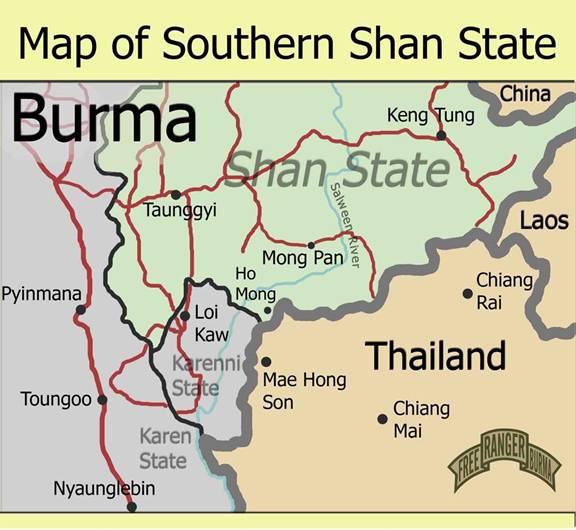 |
| Map of Southern Shan State |
|
This report is being sent directly from an FBR relief team in the Shan State and ends with a testimony and interviews taken by Partners Relief & Development (PRAD) who are working alongside FBR teams. We are here training five new Shan FBR relief teams that will give help, hope and love to those in need in Shan State. We are impressed by the organization and generosity of the Shan resistance and villagers. Their earnest smiling faces and can-do attitude inspire us. We are grateful for their help. The Background and stories below bear witness to the brutalities inflicted on these people by the dictators of Burma. At the same time, we want you all to know that there is hope. We see this hope in the actions of the relief teams, the resolve of the resistance, and the dignity and kindness of the villagers. Thank you for being part of that hope as well. God bless you, Free Burma Rangers Report: |
Introduction:
The Shan State is the largest and most populous ethnic state in Burma. The Shan ethnic group are the largest (8-10 million) of the many ethnic groups within the Shan State. All the people of Burma live under oppression but like other ethnic minorities, the Shan are especially targeted for attack. What was once one of the most prosperous areas of Burma is now an impoverished and oppressed area where the Burma Army attempts to exert complete control.
Over 1 million Shan people have been displaced and thousands killed.
The dictators exploit the Shan State’s timber and mineral resources with little benefit to the people and a destructive result to the environment. Due to government attacks, oppression and lack of care, education is not available for many in Shan State and public health continues to decline as HIV rates climb. Here, the Burma Army and its proxy forces produce the second greatest amount of opium in the world and the most amphetamines in S.E. Asia.
In spite of all these challenges the people of Shan State have not given up and many work together to give needed material, medical, educational and capacity building support.
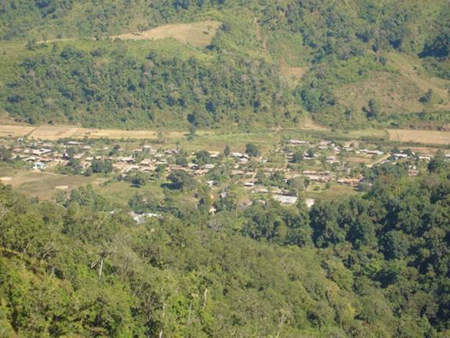 |
| Photo: Ho Mong Valley. Nov. 06. |
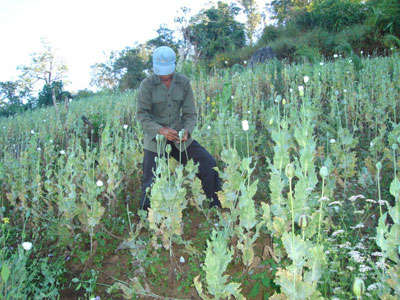 |
| Photo: Villager cultivating poppy for Opium production near Ho Mong. Nov. 06. |
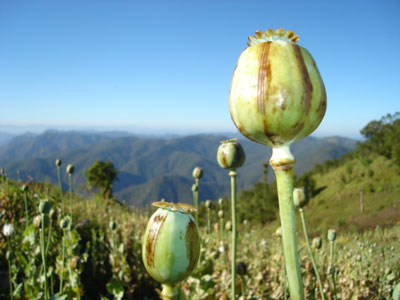 |
| Photo: Poppy bulbs being cultivated to produce opium. Nov. 06. |
Burma Army Abuses reported by FBR teams in Southern Shan State
Rape and Murder:
Burma Army soldiers rape three Shan women for three days
On 9 October, 2006, six soldiers from Burma Army IB 9 and LIB 2 raped three Shan women from Xx village in Ho Poong Township, Jay Shee District. Pba Xx, 50, Nai Xx, 40, and Nang Xx, 12, were walking outside their village when they were confronted by the soldiers. They were captured, and then beat, cut with knives and raped repeatedly for three days. The women were also forced to give the men oral sex. After three days the women were released after being warned not to tell anyone what had happened to them.
All three had been injured severely, Pba Xx with severe head trauma, and Nang Xx with cuts and damage to the groin. A local medic named Xx gave them initial medical care, but when the Burma Army found out he had helped them, they found him and beat him. Because the women had been injured so severely, Pba Xxs younger sister took them into Xx Xx town, the location of the Burma Army camp from which the soldiers had come, for further treatment.
No further information is currently known about the condition of the women, but they are believed to be alive.
On 12 October, soldiers from the same units entered the womens village, physically assaulting most of the villagers, and stealing 2 large bags of old British Coins which the villagers use to make decorative dresses, as well as one cow, one horse and one buffalo.
Burma Army murders villager
On 1 January, 2007 soldiers from LIB 505 captured Lung Kerng, 50, from Wan Na Neua village in See Paw Township. They held him for one week, and then killed him on the 8th. The soldiers then stole all of his animals, gold, and other valuable belongings.
Theft and Extortion:
On 5 November, 2006 Burma Army troops entered Xx village in the Muang Nong area of Muang Yay District and looted the village. As they stole property they also shot Pba Xx, one of the villagers. They then cut her head and warned her that if they received help from the Shan State Army (SSA), they would come back to the village and kill everyone. The troops eventually stole 8 buffaloes, 33 chickens, household items, valuable clothing and more than 60,000 kyat.
On 27 November, IB 517 entered the village of Xx in Muang Kerng Township, and demanded a tax from the villagers. Every house was forced to provide one pig, one cow, one buffalo and 20,000 kyat. The villagers were also warned that if they asked for help from the SSA or sent news of their situation the whole village would be killed.
On 3 February, 40 soldiers from IB 525, under the command of Aung Pon, stole property from Xx village in Muan Kerng Township. They stole 14 chickens, 7 pigs, 1 buffalo, other valuables and more than 2 million kyat.
On 24 April, soldiers from IB 246 and 524, based and Kun Hing, came down individually to Xx village and demanded beer, liquor, fish and rice from the villagers and more than 250,000 kyat. Thy then asked the village headman about SSA activity. When he told them he knew nothing they beat him.
On 28 April, IB 248, based at Xx, came into the village and demanded 15 chickens, 3 cows and more than 550,000 kyat from the local villagers. They also beat the headmans young son and another two adults. They then tied and strung up the village headman. They told him to never give out information or they would kill the whole village like in 1996.
On 27 April, IB 248 confiscated the property of villagers from Xx village in Nam Chang District. They then built a fire and threw all of the belongings into the fire. They then demanded 12 chickens, 2 cows, 1 buffalo, oil, rice, and more than 3 million kyat. They then beat the headmans son, breaking his leg and arm. They told the villagers that every time they come to the village, the villagers should be ready for them with everything they may demand. They told them this wasnt their country, they werent citizens, and that there would never be democracy. They said they could do anything to the villagers and no one would ever know.
On 6 July, 2007, two armed Burma Army soldiers stole a villagers property in the Ho Mong area of southern Shan State. The two soldiers ran into Lung Xx, a local merchant who purchases goods in Ho Mong and then sells them in the surrounding small villages. When Lung Xx was in Ho Mong, close to the main chedi, the two soldiers met him along the way, pointing their guns at him and forcing him to give them cans of fish and milk. They then told him he wasnt allowed to sell goods anymore, and that he was to go home. According to local sources, this type of incident occurs at least three times a week in the Ho Mong area.
On 3 September, 2007 Burma Army soldier Kong Sang Khieng came down to the pond which is located in Ho Mong, and proceeded to try to shoot fish in the pond. After doing so unsuccessfully, he moved to the house of Xx and stole vegetables from his garden. After taking a full bag of melons and other vegetables, Kong Sang Khieng then destroyed the mans garden.
Narcotics Production and Oppression: Ho Mong, Southeastern Shan State, Burma:
Background:
The area of Ho Mong is just west of the Thai border and Mae Hong Son Province. It is in a valley just inside the Shan State, Burma, and is north of Mae Hong Son town, Mae Hong Son Province, Thailand. (Ho Mong: Lat/Long: N 19 45 30 E 097 59 00.)
The people of the Ho Mong area live under the oppression of both the Burma Army and their local proxy the Southern Shan State Army (SSS). The SSS are led by Maha Ja, a Wa warlord who controls 300-500 troops and who has been given partial authority over this area by the Burma Army. The SSS is also involved with the Burma Army in narcotics trafficking in the Ho Mong area.
The living situation for the people is feudal with the people able to make a bare living, but under the domination of the Burma Army and SSS they have no real control over their lives. Please see excerpts of two cases of abuse, rape and murder that occurred in this area at the bottom of this report. These are from two reports we have sent out earlier. (*Note the Southern Shan State Army (SSS) is a proxy army under the control of the Burma Army while the Shan State Army (SSA) is a pro-democracy resistance organization.).
The people of Ho Mong seem to have accepted the feudal system they live under. They do not like it but they can survive and it is too dangerous to try to change it without help.
The valley is fertile and there is enough food. The Burma Army controls all commerce and forces people to grow Castor plants for oil. (This is a Burma wide program that is forced on the population.) The Burma Army and SSS tax all goods. For example, each truck is taxed 1,000 Thai baht per year and each cow 1, 200 Thai baht. The Burma Army and SSS control the roads. The main road from Ho Mong to the Thai border at Na Mong Long is usable all year. There are 5 major Burma Army camps and three SSS camps in this immediate area. Schooling is very poor with teachers charging ‘extra fees’ for children to attend school yet regularly not showing up to teach. As a result many children who are close enough walk across the border to attend schools.
Young people and girls at risk:
The scourge of narcotics is not only exported out of this area but the people here suffer as well. Many young people use amphetamines as they are readily available and because there is no real felt hope for a future.
Young women and girls are especially at risk and some are trafficked into Thailand to work in the sex industry.
History:
The area of Ho Mong has seen many masters; in recent history most of them have been bad. In the Eighties the Drug lord Khun Sa of the Mong Tai Army (MTA) controlled one of the world’s largest narcotics armies. In spite of an army supported by drugs, Khun Sa enjoyed some local support as he was seen as the most effective counter to the Burma Army in the Shan State. Many of the people who now live in Ho Mong fled oppression of the Burma Army elsewhere in the Shan State and moved here to live under the MTA’s protection. In 1996 Khun Sa accepted amnesty from the dictators of Burma and moved to Rangoon. The MTA collapsed and the soldiers who wanted to continue the fight for freedom reformed the Shan United Revolutionary Army (SURA), which then became the Shan State Army (SSA) under Col. Yod Suk.
The SSA is under the political organization of the Restoration Council of the Shan State (RCSS) and is fighting for liberty, the restoration of democracy and a free Shan State. The SSA has from their inception announced a campaign against narcotic production, trafficking and use in the Shan State.
Human Trafficking:
The Ho Mong area is used by human traffickers as a primary location for the movement of people across the Thai-Burma border. According to the SSA, approximately 100 people are trafficked across the border close to Ho Mong every month. There are 25 individuals in the Ho Mong area who are actively involved in the trafficking of people across the border. One woman, Nang Kham Ing, brings people down from Lashio, and then sells them to her Thai counterparts for 2,000 baht per person. Those trafficked have already paid her 240,000 kyat to help them across the border, where they hope to find a better life, only to find themselves being sold to traffickers. Nang Kham Ing has already trafficked more than 60 people. The traffickers pay a fee to the Burma Army of 100 baht per person, 50 baht to the SPDC police and 250 baht per person to the SSS in exchange for allowing their operation to continue.
Partners Relief & Development (PRAD) Interviews, Conclusions and Recommendations
PRAD Staff interviewed several IDPs during the trip. The following are summaries of their stories. Their names and the names of their villages have been omitted from this report for security reasons:
Interview 1: Nang Sxxxx, aged 17, from X village in Wiang Lay Ka Township
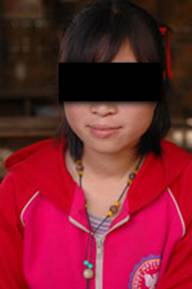 |
| Nang Sxxxx |
In 2000 SPDC forces came to Nang Sxxxs village. Most of the villagers managed to run and hide in the jungle before soldiers occupied her village. Her family was not able to escape in time. They forced her father porter supplies, kept him as their slave, and beat him. On one occasion they forced him to go into the jungle to find villagers and bring them back to the village. When he returned alone they beat violently. Nang Sxxxx and her mother were in the room when this happened. The SPDC soldiers left their home and Nang Sxxxx father bled to death.
After her father died Nang Sxxxx and her mother moved into a forced relocation site in Huey X. The SPDC told them and the others living there that if they returned to their villages they would shoot them. Many people died of disease and inadequate resources. Nang Sxxxxs mother travelled secretly to their farm many times to collect food and tea that they cultivated. She never returned from one of her trips. She heard that the SPDC captured her. (At this point in the interview Nang Sxxxx wept) This left her in the care of her Aunt.
Nang Sxxxxs Aunt had three children of her own and was barely able to care for them. When she heard that there was a school and boarding home in Tai Leng, she sent her niece there.
She has lived in Loi Tai Leng for 5 years and is a diligent student. Her desire is to finish school and become a doctor so she can serve her people.
Interview 2: Sxxxx Hx, aged 14, from X village, Ho Mong Township
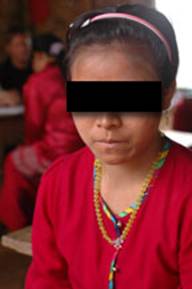 |
| Sxxxx Hx |
Sxxxx Hx was cared for by her grandfather until she was 10 years old. She was told that the SPDC killed her mom and dad.
In 2003 a trader came to her and told her that she had an older brother in Thailand who wanted her to join him. Her grandfather sent her with this trader who took her to X village and sold her to a farmer for 6 sacks of rice. She worked as a slave under harsh conditions. One day she went to a local temple for a celebration. On her way back to the farm she met an SPDC soldier who raped her.
Five days later an FBR relief team came through her village and found out what happened to her. They took her with them and let her live in the home of one of the team members for a few months before getting her into the girls hostel. Having never attended school she is now in second grade. When she grows up she wants to be a teacher and serve her people.
Interview 3: Num Sxxxx, aged 18, from X village in Keng Lom Township
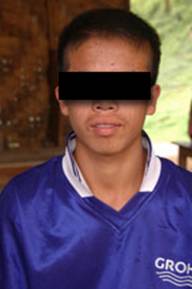 |
| Num Sxxxx |
In 2000 Num Sxxxx went with his family to harvest rive in their fields. SPDC soldiers came to their farm and took mother and father away leaving him and his five brothers alone. They never saw them or heard from them again.
Ba xx xxxx and her husband took them into her home for two years before sending them to Keng Lom to study at a boarding school. Num Sxxxx was the best student of his five siblings. He was sent with SSA Soldiers for further studies in 2003.
Num Sxxxx wants to finish school and open a boarding home for displaced and marginalized children.
Interview 4: Leung Parn, FBR Relief team member
Leung Parn was an SSA soldier. During missions and patrols he has helped numerous people. He served a one year term as an FBR relief team member (GLC) in 2006 and now serves the RCSS as a journalist. The following three testimonies were documented and verified by him.
2002, Ho Mong Township, xx xx village, Burma Army (LIB 132) entered the house and met Nai Cxxxx. She was 50+ years old. She was alone. The soldier pointed the gun at her and raped her.
2002, Ho Mong Township, xx xx village, Nong Ixx went to collect firewood. She was 30 years old and married with two children. She met BA soldiers in the jungle. Five of the soldiers raped her. She is still living in Ho Mong Township.
2002 BA soldier raped a woman named Nong Mx and she got pregnant. After the baby was born the soldier kept going to the womans village and raping her. She couldnt take it anymore and ran away leaving the child behind. The baby, now 5 years old, is being cared for by grandmother in Ho Mong Township.
Humanitarian Situation:
Internally Displaced People, (IDPs), are among most vulnerable group of people in the world. IDPs are those who face persecution or oppression but who did not or could not flee their country.
IDPs have few options for help. They have no adequate shelter and are continually plagued by disease and hunger. The international community does not recognize the status of IDPs and thus provide little protection or assistance to them. They are not protected under international refugee law. Unlike the funding for refugees, no overall funding exists for IDPs.
From hidden settlements in the Burma’s jungle, internally displaced people (IDPs) face a huge challenge to survive. Disease is rife, education nearly impossible and food desperately short.
Conclusions and Recommendations by Partners:
In light of the brutal occupation of Shan State and continuing military offensives against civilian villages in Shan State, which has resulted in the displacement of over 1 million people, the widespread, systematic use of rape, torture, bodily mutilation and killings in Shan State and in other areas, as well as the continuing use of forced labour and other abuses in Mon State, human rights violations taking place throughout Burma, and the continuing detention of Aung San Suu Kyi and over 1,100 political prisoners, PRAD makes the following recommendations to the international community:
- To the United States of America to strengthen its position on Burma, calls for humanitarian support for the IDPs
- To the United Nations for the Security Council to continue to monitor the situation and to take action to bring an end to the gross violations of human rights, and for the Secretary-General to increase his engagement through the use of his good offices in putting pressure on the SPDC to enter into tripartite dialogue with the National League for Democracy and the ethnic nationalities;
- To citizens everywhere to act on behalf of the people of Burma and give generously towards the overwhelming humanitarian needs inside areas of forced relocation and displacement.
- To the Church worldwide That prayers be offered and that the church act decisively and generously to minister to the vulnerable and victimized people of Burma.
